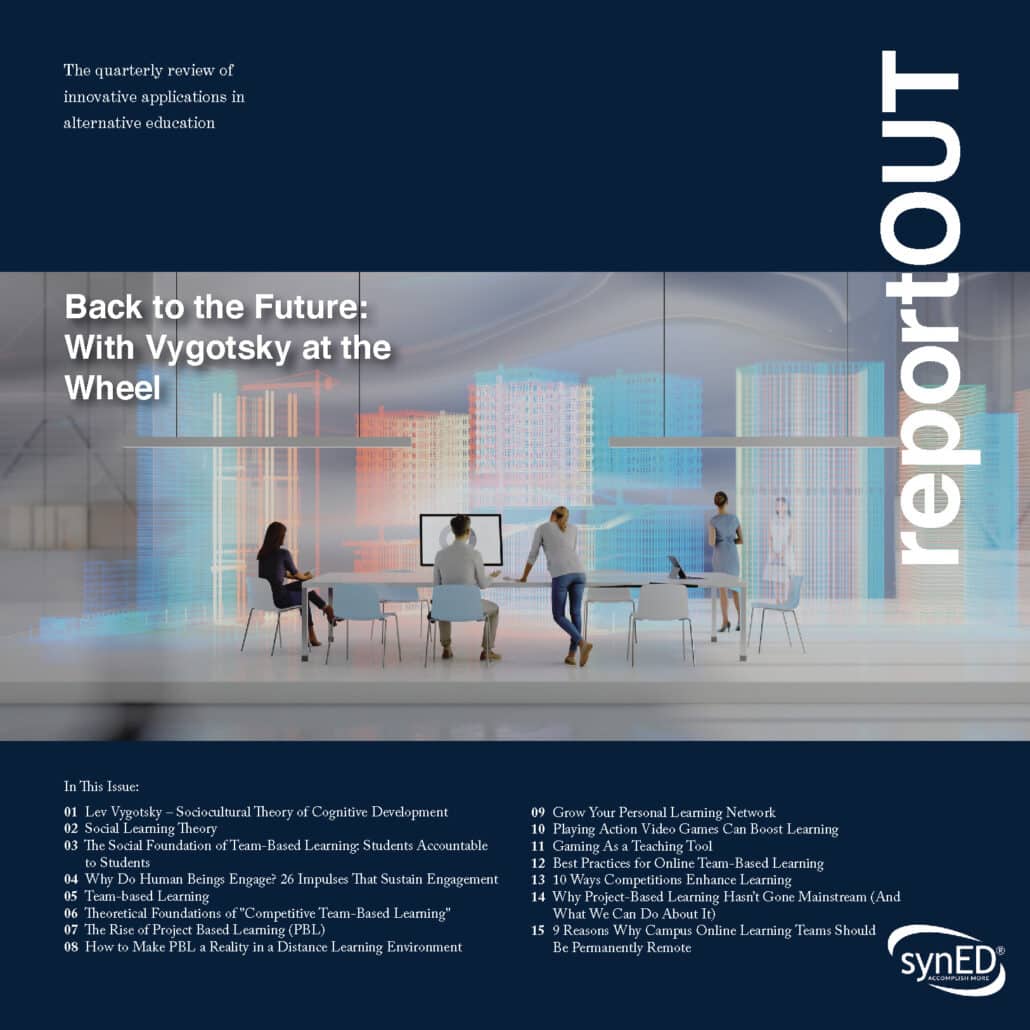ReportOUT looks at theories behind Team-Based Learning (TBL), offers insights on social learning and how games and competitions can boost learning
THOUSAND OAKS, Calif. – SynED, a national non-profit focused on education, today released ReportOUT, a quarterly publication that highlights innovative educational initiatives that promise different perspectives and lasting changes, with its latest edition entitled “Back to the Future: With Vygotsky at the Wheel.”
ReportOUT includes insights from across the economic, education, and political world, bringing a diverse array of viewpoints and analysis on how to approach education differently. In Volume 11, ReportOUT considers the benefits of team-based and collaborative models of education, taking a fresh look at theories of learning pioneered by Lev Vygotsky and Albert Bandura.
“You already knew that your friends taught you more than your teachers. And in some cases, they have more to offer,” said Guy Smith, Executive Editor, ReportOUT. Mr. Smith, a former Vice President at Antioch University who also previously served as the Dean of Educational Programs at Santa Barbara City College, continued: “The popularity of collaborative learning in the workplace has increased dramatically over the last decade. With the emergence of many new collaborative tools, as well as the cost benefit of being able to reinforce learning in workers and in trainees during collaborative training, many work environments are now looking toward methods that involve collaborating with older employees and giving trainees more of a hands-on approach.”
This issue is a compendium of 15 articles that provide insight on the rise of project-based learning, the importance of social interaction in learning, and how problem-based learning can still be achieved when distance learning is required. The promise of competitions and video games as social learning platforms is addressed in several articles.
An article by Dr. Serhat Kurt, which first appeared in Educational Technology, looks at the theory of learning presented by Lev Vygotsky (1896-1934). Vygotsky, a Russian teacher considered a pioneer in learning in social contexts, was convinced that learning occurred through interactions with others in our communities: peers, adults, teachers, and other mentors. “It is important to note that the education system influences the thoughts and belief systems of the children within,” writes Dr. Kurt. “One’s teachers and peers directly affect cognitive development by the language they use and the interpretations they offer of cultural events. While Piaget believed that a child builds a unique view of the world, Vygotsky suggested that others within a child’s social circle influence their perspectives, values, and attitudes.”
In “The Social Foundation of Team-Based Learning: Students Accountable to Students,” Michael Sweet and Laura M. Pelton-Sweet take note of the growing understanding of the social dimension of the classroom and argue that team-based learning generates enhanced accountability among students. “What sets TBL apart from other forms of small group learning,” the authors write, “is its accountability structure—a rhythm of moments in which students’ social and intellectual experiences of the classroom become interlocked and amplified.”
While using games in the classroom is nothing new, the field of games and learning has expanded dramatically in recent years. “Video games and simulations create new social and cultural worlds – worlds that help people learn by integrating thinking, social interaction, and technology, all in service of doing things they care about,” Smith notes. “What could be more collaborative than multiplayer games?”
“Swiss Psychologist Jean Piaget famously said, ‘Knowledge is a consequence of experience,’” Smith concluded. “The growth of Project-Based Learning as outlined in several articles in this volume reflects this observation.”

